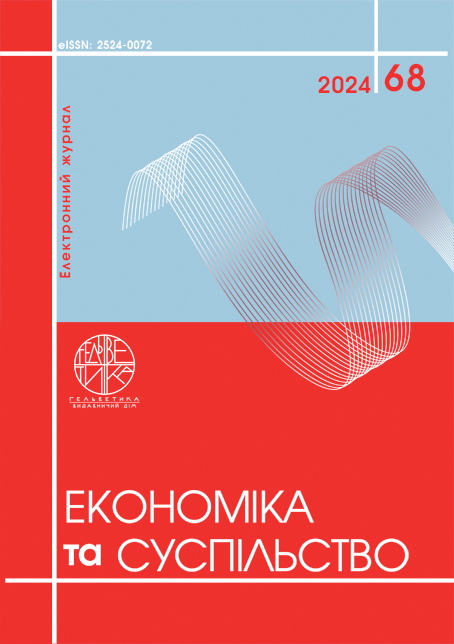MACHINE INTELLIGENCE RESHAPING THE EDUCATIONAL LANDSCAPE (A THEORETICAL PERSPECTIVE)
Abstract
The relevance of the topic lies in the explanation that the modern world is rapidly changing under the influence of technological progress, and education cannot be left aside from these transformations. The integration of artificial intelligence (AI) into the educational space is one of the key directions of modernization of education, which allows it to adapt it to the needs of the new generation and increase the efficiency of the educational process. AI offers a wide range of tools and opportunities for improving education, from personalizing learning to automating routine tasks. The purpose of the article. - to theoretically substantiate the need to use AI in the educational space. It reveals the advantages of AI for various aspects of the educational process and analyzes its existing capabilities for creating a more effective, personalized and inclusive learning environment. To achieve the goal, the article used a set of scientific research methods. also, an analysis of scientific literature on artificial intelligence and its application in education was conducted, a truly comparative analysis of different approaches to integrating AI into the educational process was carried out, and the synthesis, generalization and systematization of the data obtained were performed. The article considers the theoretical aspects of the use of AI in education, identifies its key advantages.
References
Celik I. Towards Intelligent-TPACK: An empirical study on teachers’ professional knowledge to ethically integrate artificial intelligence (AI)-based tools into education. Computers in Human Behavior. 2023. pp. 107.
Chen X. et al. Two decades of artificial intelligence in education. Educational Technology & Society. 2022. pp. 28–47.
Devi J. S. et al. A path towards child-centric Artificial Intelligence based Education. International Journal of Early Childhood. 2022. Vol. 03. pp. 2022
Alam A., Mohanty A. Foundation for the Future of Higher Education or ‘Misplaced Optimism’? Being Human in the Age of Artificial Intelligence. Innovations in Intelligent Computing and Communication: First International Conference, ICIICC 2022, Bhubaneswar, Odisha, India, December 16-17, 2022, Proceedings. – Cham : Springer International Publishing, 2023. pp.17–29.
Kozak , M., Shhygheljsjka, Gh. (2016). Shtuchnyj intelekt: dobro chy zlo? [Artificial intelligence: good or bad?]. Available at: https://core.ac.uk/download/pdf/74515814.pdf (accessed November 10, 2024).
Polishchuk O., Polishchuk O., Dudchenko V. (2022). Filosofiia shtuchnoho intelektu v osvitnomu protsesi [The philosophy of artificial intelligence in the educational process]. Humanities studies : Collection of Scientific Papers. Vol. 13 (90). P. 103–109. DOI: https://doi.org/10.26661/hst-2022-13-90-12 Policy guidance on AI for children. UNICEF. 2021. 60 p. URL: https://unicef.org/globalinsight/reports/policy-guidance-ai-children (Last accessed: 29.06.2023).
Policy guidance on AI for children. UNICEF. 2021. 60 p. URL: https://unicef.org/globalinsight/reports/policy-guidance-ai-children Policy guidance on AI for children. UNICEF. 2021. 60 p. URL: https://unicef.org/globalinsight/reports/policy-guidance-ai-children (Last accessed: 29.06.2023).
Celik I. Towards Intelligent-TPACK: An empirical study on teachers’ professional knowledge to ethically integrate artificial intelligence (AI)-based tools into education. Computers in Human Behavior. 2023. Т. 138. С. 107468.
Chen X. et al. Two decades of artificial intelligence in education. Educational Technology & Society. 2022. Т. 25. № 1. С. 28–47.
Devi J. S. et al. A path towards child-centric Artificial Intelligence based Education. International Journal of Early Childhood. 2022. Т. 14. № 03. С. 2022.
Alam A., Mohanty A. Foundation for the Future of Higher Education or ‘Misplaced Optimism’? Being Human in the Age of Artificial Intelligence. Innovations in Intelligent Computing and Communication: First International Conference, ICIICC 2022, Bhubaneswar, Odisha, India, December 16-17, 2022, Proceedings. – Cham : Springer International Publishing, 2023. С. 17–29.
Козак М., Щигельська Г. Штучний інтелект: добро чи зло? URL:https://core.ac.uk/download/pdf/74515814.pdf (дата звернення 10.10.2024).
Поліщук О., Поліщук О., Дудченко В. Філософія штучного інтелекту в освітньому процесі. Humanities studies : Collection of Scientific Papers. 2022. Вип. 13 (90). С. 103–109. URL : https://doi.org/10.26661/hst-2022-13-90-12 (дата звернення 10.10.2024).
Policy guidance on AI for children. UNICEF. 2021. 60 p.
URL: https://unicef.org/globalinsight/reports/policy-guidance-ai-children (дата звернення 10.10.2024).

This work is licensed under a Creative Commons Attribution 4.0 International License.


